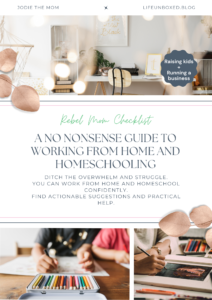Today we are going to talk about the biggest question always asked by new homeschoolers. What about socialization? What social opportunities are there for kids?
As a second generation homeschooler, the question about social opportunities is always the first one asked. And I’ve heard it for over 25 years.
I am going to let you in on a little secret. The people who are most concerned with this questions are those who don’t actually homeschool.
Most of the time it is a sincerely asked question, but it is rooted in a myth.
Before we dive in, let me say this. My intention is not to be controversial, but to calm any fears from my personal experience. Here’s the myth: kids can only make friends or be social in a school setting.
Some of the links in this post are affiliate links. If you purchase using one of these links, I make a small commission at no additional cost to you. This helps me keeps things free for you, and who doesn’t love free stuff. For more information, see my disclosures.
The Myth Persists: Social Opportunities Don’t Exist for Homeschoolers
There was one particular moment that I encountered this comment that really stands out to me. My sister and I were hanging out with one of our neighborhood friends. It was a few weeks before the first day of school. My sister and I were homeschooled, and our friend attended public school. We were talking about school shopping, and she made the comment that we don’t need to do it because we were homeschooled and not social (this is not a direct quote).
This story stays with me because it was an observation that was made based on a false assumption, as opposed to her relationship with me. We were friends, so obviously there was some socialization. I played city league basketball with them. Attended dances at the jr. high. I had plenty of neighborhood friends. I played basketball and ran track at the jr. high as well. We hung out with the same friends. So this idea that we weren’t social because we were homeschooled was totally contrary to what was actually known. But the idea persisted despite the facts.
The Stereotype
This idea still persists. The stereotypical homeschooler is some sheltered, anti-social person, who will end up living in their mother’s basement playing video games at 35. The term homeschooler is used as an adjective to describe any anti-social person.
I am going to dispel these ideas, because it is just not true. Homeschooling is not solitary confinement. Tim Tebow was a homeschooler and he married Miss Universe. Are there some anti-social homeschoolers. Of course. But are there some anti-social public schoolers. Absolutely.
Social Opportunities Out of the Box
The opportunities to socialize outside of the prescribed public school format is a strength of homeschooling not a negative. That was so good let me say that again.
The opportunities to socialize outside of the prescribed public school format is a strength of homeschooling not a negative.
We also need to change our mindset that public school is the best way to socialize. It isn’t. It is just familiar. So let’s break the mold. Just because we are used to doing something one way doesn’t mean that it is the best way.
The Strengths of Homeschooling Social Opportunities
1. Adult models rather than just peer models.
This is a good thing. I know growing up I always heard about peer pressure and avoiding bad influences. Now, don’t get me wrong you can find bad influences anywhere.
But as a homeschooler you have more exposure to good adult role models. Instead of a group of peer models.
As a kid peers are just like you. They don’t offer something to attain to. Whether through co-ops, meet ups at the park, going over to friend’s house, being able to get a job during the day, hanging out with grandparents. Homeschoolers have more opportunity to be around adults and interact with adults.
2. Life is not setup in groups of people all our own age.
Think about your own life experiences. After graduating high school was there any other time you were in a group of people your own age? The answer is probably not.
Even in college. If you went to college, everyone there was not your own age. There were probably some who were close in age, but everyone was not born in the same year you were.
Homeschoolers have more real world experience. They’re constantly around a variety of age groups. Usually they’re from big families too. Therefore, they learn to communicate and relate to different people of all ages because it becomes more of a life skill that they have to have right now, as opposed to a life skill that they have to learn once they’re out of public school.
It also keeps their expectations in check; they don’t expect everyone to act like them. Which is a big deal. When you’re in a peer group, everyone starts to act like each other. When you’re in different age groups, just because of the diversity of the ages, you learn that everyone is different and how to relate them at their level.
3. Learn life skills for the workforce and later in life.
Every job, from when I was in high school to later in life, was always made up of different age groups. There was never a time when I worked with a group that was all my own age.
Learning to work with a variety of people, in multi-generational groups sets up a homeschooler for success. And gives more opportunity to learn from those who are older.
Think of the apprentice/master relationship, not just talking about the Jedi, but that used to be how young people were educated.
4. Learn to cultivate authentic relationships based on interests rather than the year they were born.
My mom told me a story, when she was in high school. she had a friend that was younger than her. But when they got to high school they couldn’t be friends anymore because she wasn’t in the same grade.
The peer pressure or the uncoolness of having a friend that was younger than you is there in the public school setting. With homeschoolers we don’t even care. If there’s someone we click with, it doesn’t matter if they’re two years younger.
My best friend in high school was 2 years younger than me. But we were both homeschooled so we didn’t have the restrictions of being in the same grade or the peer pressure of that we couldn’t be friends. Let me tell you, we were the best of friends in high school. That wouldn’t normally happen in public school.
5. Learn to be independent thinkers instead of group thinkers.
I read something, I can’t remember where I read it, but it stuck with me. If you put people in a group and the majority of the group believes something to be true, like the sky is magenta, then the rest of the people in the group will also start to agree that the sky is magenta in complete contravention of the facts. This is called group think.
This is what happens in a public school setting. Kids are taught what to think instead of how to think. If everyone in the group is saying the sky is magenta, then the one or two kids who are disagreeing with the group will start agreeing with the majority. Because that’s what the majority thinks. The idea is, even though they know it’s wrong because so many people actually believe it to be true, then it must be.
As a homeschooler, kids have time to work out arguments with the full facts at hand. Instead of being influenced by what the group thinks is true. We can have discussions and wrestle with both sides of the argument. This is something that parents need to be involved in.
With the older kids, when we have discussions, whether they are political, theological, mundane, or just whatever. We will tell them that there’s times when we’re just going to take the opposite argument that they present. Even if we agree with them. Just so they can fully understand both sides and be presented with both sides of the argument.
Teach your kids how to think
This is how you start to teach your kids how to think. Not what to think. Give them both sides of the argument. All the facts at hand, and let them wrestle with it. Even in their own immaturity, let them wrestle with it, and let them draw conclusions. Then ask them how they reached that conclusion.
In public school, you have the opposite. They don’t necessarily have the opportunity or the time to take on facts or take on issues this way. So students are often told this is what you need to think and we’re moving on.
Now that we’ve talked about the positives of being homeschooled and let’s talk about some ideas for social opportunities.
Ideas for Social Opportunities
My sister and I were homeschooled and my dad was in the military. So we moved a lot. Every place we moved always had some opportunity for homeschoolers. Whether that was a co-op, meet up, or church. Wherever we went, there was always social opportunities. Wherever you’re at, there are social opportunities for you. And I can say that from my own personal experience.
1. Co-op
Typically, a co-op is a group of parents get together, and they decide that one parent will teach a class on this topic. Another parent will teach this, and everyone is helping and participating so that the kids can have extra-curricular classes.
I’ve personally taught art our co-op and it’s been a blast doing it. My kids have taken many different classes.
Here is a list of local homeschool organizations.
2. Park Meetups
New homeschoolers are really looking for community and ways to connect. Park meetups are a great place to meet other families. This is a low pressure way to for kids to play and for you to talk to another adult.
Ideas to make these connections, leads into the next idea
3. Find Groups on Social Media
There are a number of different local groups that you can join on social media. I’ve seen many moms make connections this way, and set up park meetups.
4. Church
This is a great place. If you attend church, there’s youth group, there’s extracurricular activities, etc
Usually, there’s more homeschoolers at church as well. So this is a great place for social opportunities.
5. Travel
You’re schedule is flexible. You can pick up in October and go somewhere if you wanted to, and take your school with you.
I haven’t personally done this, but my sister had an opportunity to spend about a month in Ireland. They packed up their boys and took them to Ireland. Wherever they were staying, they spent time in the cities and played in the parks.
This is an opportunity you would not typically get in public school because you are constrained by the schedule.
My goal of this post was not to say public school is bad. But to debunk the myth that homeschoolers are anti-social. And to give you, mom, a reason not to stress.
I know when you are starting out homeschooling it is overwhelming. The thoughts constantly go through your mind, am I doing enough, am I enough, am I turning my kids into those homeschoolers everyone talks about. Homeschoolers have a structure of socializing that is outside of the box. And this is a good thing.
Give us some more ideas for social opportunities in the comments below.





















What a fantastic post! We’ve been thinking about homeschooling, and socialization was our biggest worry. Thank you for putting so much into perspective here!